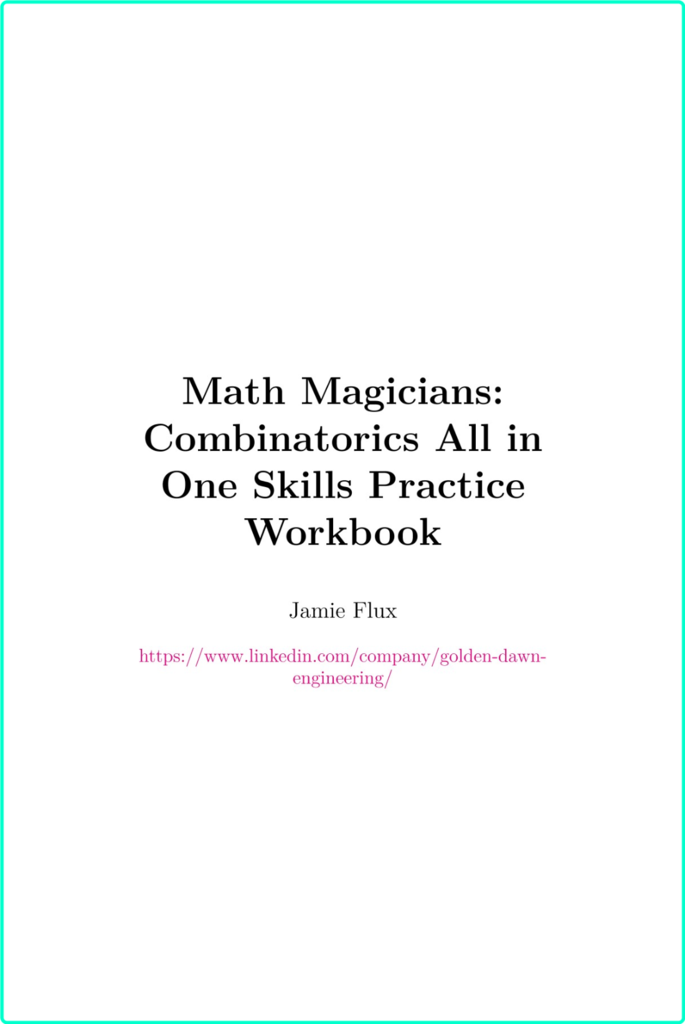- Témaindító
- #1
- Csatlakozás
- 2023.06.08.
- Üzenetek
- 31,126
- Reakció pontszám
- 202
- Díjak
- 6
- Kor
- 36

English | October 14, 2024 | ASIN: B0DK2VW8SF | PDF | 8.16 Mb
Book Description
Whether you're a student, mathematician, or enthusiast of mathematical puzzles, this book offers an exhaustive exploration of combinatorial concepts. Each chapter delves into specific topics, from fundamental principles to complex theories, ensuring that you gain a thorough understanding of both the basics and the more intricate aspects of combinatorics. Packed with real-world applications, exercises, and examples, this guide is an indispensable resource for anyone looking to enhance their knowledge or tackle challenging problems in combinatorial mathematics.
Key Features
• Comprehensive exploration of fundamental combinatorial concepts.
• Advanced topics such as Polya's enumeration theorem, Macdonald polynomials, and more.
• Practical applications and problem-solving strategies.
• Exercises and examples to test and enhance your understanding.
• Suitable for students, researchers, and mathematic enthusiasts.
What You Will Learn
• Understand the Fundamental Principle of Counting to sequence event possibilities.
• Master permutations and combinations to efficiently arrange and select objects.
• Apply the Binomial and Multinomial Theorems to expand expressions.
• Utilize the Inclusion-Exclusion Principle for calculating set unions.
• Discover applications of the Pigeonhole Principle in proving existence.
• Explore derangements and calculate permutations with fixed points.
• Count permutations with Stirling numbers of both first and second kinds.
• Analyze Eulerian numbers for permutations with specific ascents.
• Calculate partitions with Bell and Catalan Numbers.
• Uncover the connections within Pascal's Triangle.
• Leverage generating functions and exponential generating functions.
• Develop and solve recurrence relations for sequences.
• Explore symmetry principles to simplify enumeration problems.
• Use Polya's enumeration theorem for counting with group actions.
• Delve into Young Tableaux and the Hook-Length Formula.
• Explore Schur Functions and the Littlewood-Richardson Rule.
• Investigate Macdonald Polynomials and their combinatorial uses.
• Apply Lagrange's Theorem in group theory contexts.
• Interpret Ramsey Theory and Turán's Theorem in graph theory.
• Implement graph coloring algorithms to minimize color usage.
• Benefit from Hall's Marriage Theorem in bipartite graph matching.
• Compute maximal network flows to optimize flow networks.
• Examine Hamiltonian and Eulerian paths and cycles.
• Calculate spanning trees using Kirchhoff's Matrix-Tree Theorem.
• Design with combinatorial structures like Steiner Systems, Latin Squares, and Hadamard Matrices.
• Apply umbral calculus and the Moebius Inversion Formula.
• Implement Discrete Fourier Transform for efficiency in calculations.
• Utilize Burnside's Lemma for counting orbits.
• Analyze group representations through matrices.
• Implement counting techniques for lattice paths.
• Discover algorithms like the Wilf-Zeilberger Algorithm for hypergeometric identities.
• Solve problems involving non-negative matrices in network models.
• Explore random graphs, graph isomorphism, and Chen's Algorithm.
• Delve into universal cycles, perfect matroid designs, and combinatorial optimization.
• Handle classic problems like the Knapsack Problem and Partition Theory.
• Integrate linear programming techniques for combinatorial solutions.
• Explore convex polytopes and utilize the Branch and Bound method.

NitroFlare Link(s) (Premium Link)
Code:
⚠
A kód megtekintéséhez jelentkezz be.
Please log in to view the code.
Code:
⚠
A kód megtekintéséhez jelentkezz be.
Please log in to view the code.
